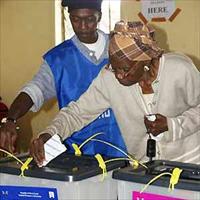COTE D'IVOIRE: Rights groups warn against "elections at all costs”

As Ivorians wonder how much longer they will have to wait for a long-overdue presidential election, human rights groups warn that failing to ensure a fair election would plunge the country into chaos.
They say too many pivotal steps – including disarmament and reunifying the country – have yet to be completed and the current climate of uncertainty is not conducive to a proper election.
“Some think that simply holding an election will automatically bring back calm and reconciliation,” Ahui Camille of the Ivorian League of Human Rights (LIDHO), told IRIN. “But going to the polls without improving conditions in the country would be futile – and dangerous.”
The presidential election, while Ivorians are quick to point out it is not a panacea, is seen as indispensable to restoring stability. After several cancellations polls are officially scheduled for 30 November. But it is widely expected they will be pushed back again. While the government has not officially rescheduled the election, Prime Minister Guillaume Soro recently told a local newspaper a new date would likely be announced soon.
In an October 2008 report LIDHO, the International Federation of Human Rights and the Ivorian Human Rights Movement say that while politicians and UN observers in Cote d’Ivoire blame primarily “technical problems” for the delays, many far more worrying conditions in the country are blocking progress and reconciliation: failure to reinstate government authority in the rebel-controlled north, deteriorating security conditions, disruptions in voter registration, absence of a unified military and a disarmament/demobilisation process at a standstill. The groups conducted an evaluation mission in Côte d’Ivoire from 27 September to 6 October.
“Only real political will can overcome all these difficulties,” the report says. “The aim is not elections for elections' sake”. The groups urge the international community not to back “elections at all costs”.
Rebels still rule
Konin Aka, prefect of the central city of Bouake, told IRIN: “Holding poorly prepared elections would be like giving poison water to a thirsty people.”
Bouake is the stronghold of the rebels who took over northern Côte d’Ivoire after a 2002 coup attempt. In Bouake and other major northern cities the rebel leaders – and not redeployed government officials – still rule, according to residents in the north.
The redeployment of the administration to the north is one of the pillars of the Ouagadougou peace agreement signed by the rebels and President Laurent Gbagbo in March 2007.
In a 13 October report on Côte d’Ivoire UN Secretary-General Ban Ki-moon says the lack of state authority in the north is worrying. Government officials who have been redeployed to the north, including the prefects “are not yet able to exercise real authority as the Force Nouvelles [rebel] zone commanders are reluctant to relinquish their administrative, security and financial authority in the areas under their control.”
Arms abound
The Secretary-General also says disarmament is not progressing. According to the report, as of 1 October 7,598 former rebels had chosen to be demobilised of the 34,678 the group declares. “Only 10 weapons and some ammunition were collected,” the report says.
Regarding the disarmament of militias, Ban says: “The government has not yet determined the arrangements for disarming, dismantling and reintegrating the militia personnel.”
Armed attacks are rampant throughout the country, severely disrupting people’s livelihoods. Market trucks and public buses are attacked by Kalashnikov-wielding men almost daily, residents say.
Corinne Dufka, West Africa senior researcher with Human Rights Watch, told IRIN: “This year we've seen a disturbing increase in violence and crime against ordinary Ivorians, much of it by members of the warring factions who have refused to commit to the disarmament process in earnest.” Human Rights Watch is closely monitoring the pre-election atmosphere in Côte d’Ivoire.
She added: “Elections and guns simply don't mix. If there is any hope for the free, fair and peaceful elections the Ivorian people deserve, the government and rebels must stop the excuses and commence the disarmament process immediately.”
President Gbagbo was elected in 2000 when he ran against the country’s first-ever coup leader, Robert Guei. Gbagbo’s mandate, which should have ended in 2005, was extended for one year under a UN peace plan. Since then several peace deals failed and polls were repeatedly scheduled and cancelled.
“Ivorians have the right to choose their political leadership,” Dufka said. “In Côte d'Ivoire, that very fundamental right is three years overdue. It's time get this process moving in earnest.”
 Back and Next - Back and Next
Back and Next - Back and Next See Also - See Also
See Also - See Also